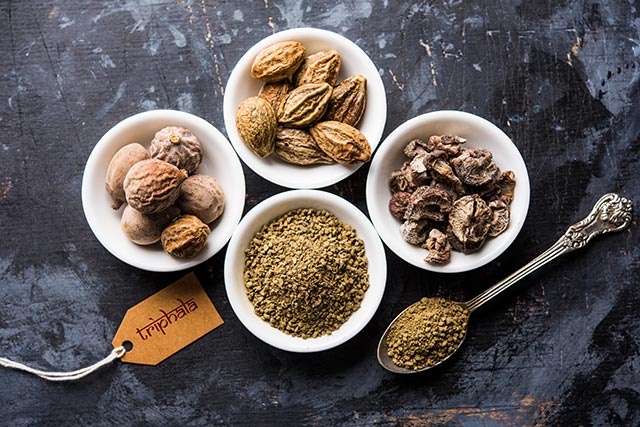
Advertisement
Ayurveda is a system of medicine with an emphasis on natural balance. This approach to wellness, which emerged from the Indian subcontinent more than 5,000 years ago, is now gaining popularity. Ayurveda encompasses different aspects of maintaining wellness – including the types of medicinal herbs used to address your illnesses and the kinds of food we eat.
According to the Ayurvedic approach, a person’s health is dependent on the balance between their mind, body and consciousness. Each person has a particular constitution of mind, body and emotions which remains the same throughout their lifetime, and Ayurveda puts the balance of these three into consideration.
Many things inside and outside your body can disturb your Ayurvedic balance – such as the emotions we feel, the food we eat, the weather, and the interactions we have in your home and workplace. These cause imbalances in your constitution, which translate into different ailments we experiences. But once the cause of the imbalance is understood, necessary steps can be taken to restore this Ayurvedic equilibrium.
In Ayurvedic tradition, the universe is made up of five elements – air, water, space, fire and earth. These elements are believed to form three distinct body types or doshas. The type of dosha you possess determines the foods you should consume more of and abstain from. Ayurveda also identifies six major tastes – sweet, salty, sour, pungent, bitter and astringent – that provide health benefits. Eating foods that contain all six tastes are encouraged, but regularly consuming foods with only a few of these tastes will disrupt you body’s natural synergy.
What are the three doshas and what should you eat and avoid if you possess this certain dosha?
Vata dosha (space and air)
The vata dosha concerns basic bodily functions – including the mind, breathing, digestion and blood flow. People with the vata dosha body type are typically thin and energetic. However, an imbalance of energy may cause them to experience digestive issues, fatigue, anxiety, weight loss and sleeplessness.
People with the vata dosha body type should cut down on eating cold and raw foods, alongside curbing caffeine consumption. Warm dishes with sweet, salty and sour tastes are better dietary choices for them. Sweet foods such as whole grains, starchy vegetables and honey provide a soothing effect to the body. Salty foods such as table salt and salted fish enhance the appetite, while sour-tasting foods such as citrus and pickled foods facilitate easier digestion.
Pitta dosha (fire and water)
The pitta dosha handles metabolism, hormones and digestion. People with this body type often have a medium build – but they risk experiencing high blood pressure, heart disease or digestive ailments when their inner balance is disrupted.
People with the pitta dosha body type people are advised to abstain from alcohol and fermented foods, alongside cutting down on hot and spicy fare. Sweet, bitter and astringent foods are better options for those with pitta dosha. Bitter foods such as leafy greens, broccoli and celery help flush out toxins from the body. Meanwhile, astringent foods like lentils, beans, green apples and pomegranate help balance pitta energy.
Kapha dosha (water and earth)
The kapha dosha controls immunity, muscle growth and strength – and people with a kapha body type typically have a sturdy frame. An imbalance puts kapha dosha people at risk for weight issues, fluid retention, lung issues, diabetes, depression and allergies.
Those with a kapha dosha body type should minimize their consumption of dairy, salty foods and heavy foods. They are encouraged to eat more foods with pungent, bitter and astringent tastes. Aromatics such as peppers, garlic, onions, mustard and ginger are good examples of pungent-tasting foods. These clear sinuses and promote sweating, making them ideal for individuals with this body type.
Following an Ayurvedic diet regardless of your body type can also help you lose weight. In a 2014 study, researchers looked at how the Ayurvedic diet in tandem with other lifestyle practices such as yoga therapy. They found that the study participants lost a total average of about 13 points over a span of nine months. They also noted that the participants who undertook the Ayurvedic diet as part of the holistic weight loss program reported more than 90 percent satisfaction.
The Ayurvedic diet’s emphasis on whole foods facilitates the absorption of important nutrients, and can even help you shed unwanted pounds. Researchers wrote in a 2010 study that shifting to whole food counterparts of processed food items with the same serving sizes resulted in as much as 50 percent more calories being burned after meals. Furthermore, herbs and spices are must-haves in the Ayurvedic diet – with a 2014 study showing that these can help make people feel fuller for longer when added to meals. Some Ayurveda spices can also boost your metabolism, so you burn more calories when you exercise.
Ultimately, you need not adhere to the Ayurvedic diet down to the last letter. Increasing your consumption of whole food and abstaining from processed food can contribute to restoring your inner synergy and proper energy flow. Perfectly balanced, as all things should be.
Visit FoodCures.news to learn more about the healing powers of whole foods and the Ayurvedic diet.
Sources:
Advertisements







